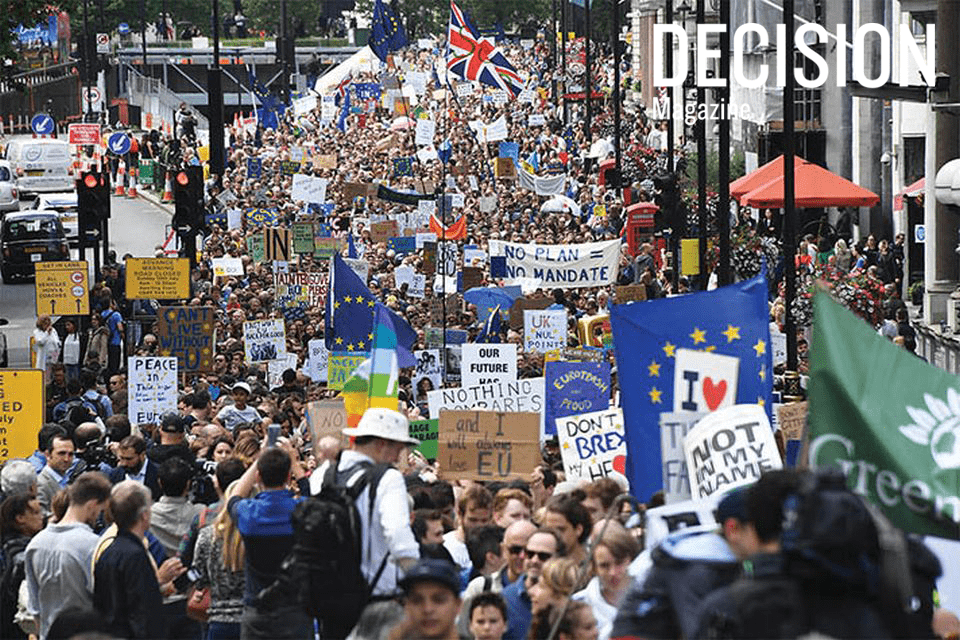
“But our citizenship is in heaven. And we eagerly await a Savior from there, the Lord Jesus Christ, who, by the power that enables him to bring everything under his control, will transform our lowly bodies so that they will be like his glorious body.” —Philippians 3:20, 21
Some years ago, on a visit to Charlotte, N.C., my breath was taken away when I was awarded the Freedom of the City by Mayor Harvey B. Gantt. It was the most generous and undeserved civic honor of my life.
Subscribe to Decision
Get your own subscription, or renewal, or bless someone by giving Decision Magazine as a gift.
Subscribe Now
But there is another City of which the Bible speaks! In a fragmenting world—with America facing its crucial presidential election and Britain in flux after its recent referendum decision to quit Europe—there is a single heavenly citizenship that alone can reassure us.
Breathtaking, indeed, was what the early Christians of Philippi learned from the imprisoned Apostle Paul: that despite their lowly status within a proud colony of Rome, they had the freedom of the city of Heaven!
And that is the privilege of every believer. My name went into the book of “Zion City” the day I received Christ. My birth certificate—or should I say my new-birth certificate—was made out for me that very day—and nothing is going to alter it!
The Heavenly City
Abraham foresaw this city! This nomadic wanderer “was looking forward to the city with foundations, whose architect and builder is God” (Hebrews 11:10). “Glorious things of thee are spoken, Zion City of our God,” says John Newton’s hymn, taken from Psalm 87. Yet, that psalm also lists various ungodly regions: Rahab and Babylon, Philistia, Tyre and Cush. Here was one of many prophecies that God would draw into heavenly citizenship people from the most unpromising backgrounds.
At our church of All Souls in London, I once baptized a journalist—a former Communist. Weepingly, he told the church, “All my life I have been working for a ‘workers paradise.’ From now on I pledge myself to the city above.” And then he hugged me. He was lining up with the “aliens and strangers on earth” (Cf. Hebrews 11:13), those “longing for a better country—a heavenly one” (Hebrews 11:16). Handley Moule once commented: “[This] doctrine of the future is much more than an antidote to death. It is the mighty animation of life.”
The city that is from above! That transforms everything. It was Augustine who rallied his Christian friends when mighty Rome—which by then had become nominally Christian—was sacked by the Goths in a single day, Aug. 24, A.D. 410. To most people, this might have represented the end of the faith. But not to Augustine. “Rome?” he asked. “Whoever is interested in preserving Rome?”
Augustine then devoted himself to writing his greatest work, titled De Civitate Dei—“The City of God.” He compared Rome’s destruction to that of decaying Sodom. He encouraged Christians everywhere, writing: “There will be an end to every earthly kingdom.” “Do not refuse to regain your youth in Christ.” “We learn from Scripture that there is a City of God, of which we yearn with a divinely-inspired affection to be citizens.”
Augustine’s book rejuvenated and shaped Europe for the next thousand years.
The Coming Savior
The city that is from above … Paul, in tingling expectation, adds, “And we eagerly await a Savior from there, the Lord Jesus Christ” (Philippians 3:21).
Even the word savior would have made connections in the popular thinking. Caesars sometimes gave themselves the title of “savior.”
Caesar Augustus would have been unaware that the only reason his name would ever be preserved would be to help date the birth of a little boy, born during his reign, who would become savior to millions of people around the world and through the ages.
The Savior we await will return historically, bodily, visibly and universally—to usher in the eternal kingdom, as the saints of God finally stand over the grave of smoking Babylon (Revelation 19:3).
The Transforming Power
With the returning Savior on His way, how will He find us? In our waiting, we are to be hard at it, in consistent living and witness to our dying world. If we don’t do it, nobody else will! The cross—and its inspiring sequel, the resurrection—this is enough to unite the world at the feet of a single individual. Here is the transforming power that has created the widest-ranging family of belief ever seen.
The truth of this was clearly demonstrated at the Amsterdam 2000 congress for preaching evangelists, organized by the Billy Graham Evangelistic Association. Some 12,000 of us were gathered together from 209 nations—a bigger span than either the Olympic Games or the United Nations. It culminated in a wonderful service of the Lord’s Supper. Think of it! The most internationally representative gathering—secular or religious—in all history was a communion service, where we sat at the feet of the once-crucified, then raised, and now coming, Savior of the world!
Can there come about a lasting unity that straddles every different grouping? The Bible says it is already here—through the leadership of one Man.
That is what waiting for the coming Savior can mean to us, whose citizenship is in Heaven. Live in the freedom of the City from above! D ©2016 Richard Bewes
Scripture quotations are taken from The Holy Bible, New International Version.
Richard Bewes is a preacher, broadcaster and hymn writer. He serves on the board of the Billy Graham Evangelistic Association in the United Kingdom and is the former rector of All Souls Church, Langham Place, London.
Give To Where Most Needed
